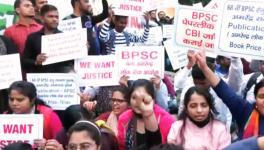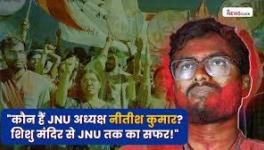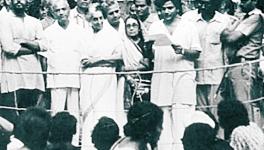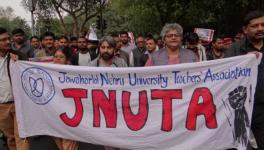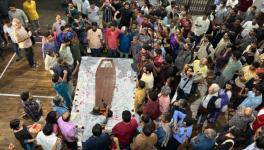'‘Krodh’, ‘Ahankar’ Characterise JNU Administration; Jagadesh Kumar Unfit to be VC'
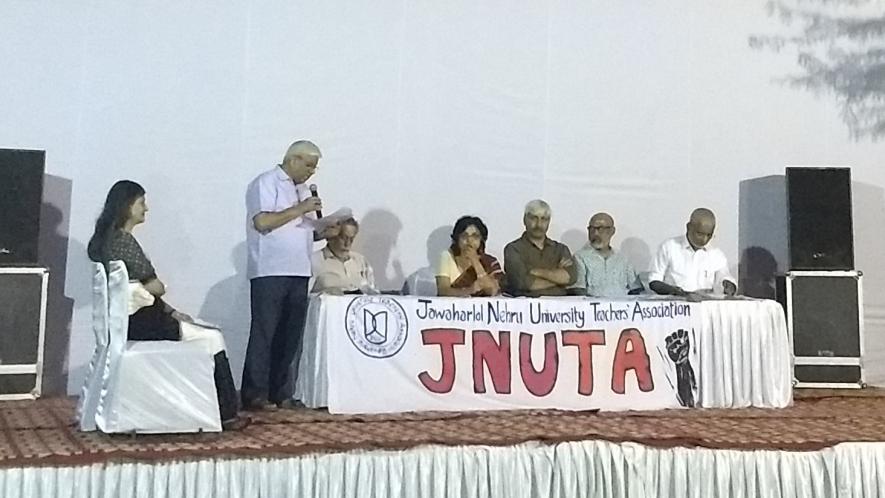
The jury of a “public inquiry” in JNU has said that Jagadesh Kumar should resign from the post of the University’s Vice-Chancellor. The remarks formed part of the preliminary observations made by a jury of eminent persons at the end of Day 1 of the Public Inquiry against the JNU VC organised by the JNU Teachers’ Association (JNUTA).
The JNUTA had earlier served a charge sheet with seven charges against the JNU VC, and decided to conduct a five-day public inquiry against him from 23 to 27 October.
The jury for Day 1 consisted of Prabhat Patnaik, Professor Emeritus at JNU, Nandita Narain, former President of the Delhi University Teachers’ Association, Apoorvanand, Professor of Hindi at Delhi University, PK Yadav, former JNUTA President, and Akshaya Mukul, senior journalist and author.
Senior JNU professors Ravi Srivastava and Jayati Ghosh presented charge 1, pertaining to “Repeated Violations of Statutory Provisions and Obligations” to the jury.
Srivastava said that the Central Educational Institutions (Reservations in Admissions) Act 2006 and the UGC regulation on minimum standards and procedures for award of M.Phil. and Ph.D. degrees have been violated by the JNU administration.
The 2006 Act mandated OBC reservations in central higher educational institutions. The Government of India had decided to increase the intake in all teaching programmes by 54% so that admission numbers in the general category were not affected. The Act says that the number of seats has to be fixed as on the date of the coming into force of the Act, and cannot be reduced thereafter unless the revised intake is approved by Parliament. But the intake in the M.Phil/Ph.D. programme was reduced from 1086 to 102 seats.
The UGC regulation says that the selection committee to appoint teachers will include three experts in the concerned subject nominated by the VC, from the panel of names approved by the relevant statutory body of the University concerned. The VC has no powers to nominate experts on his own. But the statutory procedure has been seriously violated to make appointments.
Transgressions of democratic functioning has become the norm. The VC has never been amenable to any dialogue, and this gives his game away. He has not had a single meeting with the JNUTA in the current term.
Surajit Mazumdar, Professor of Economics and elected member of the Executive Council (EC), was censured by the EC for expressing dissent. The students union office-bearers who are members of the academic council were barred from it by decisions communicated by the Registrar, not the chairman of the AC during the proceeding. Prof. Nivedita Menon's chairpersonship has been terminated and she has been debarred from holding statutory positions without giving any ground, ostensibly because of her conduct in statutory meetings.
Jayati Ghosh said that there is a method in the madness. There is a very clear political intent, which means that all academic criteria are denied.
There is a rule that Academic Council meetings must take place twice every semester. But since Jagadesh Kumar took charge, there were at best, one, and mostly they happened during vacations. In these meetings, there was extremely rude behaviour on the part of the chairman of the meeting, and women faculty members were routinely told to be quite. Microphones were taken away from them. The VC got the agenda to be read out by the Registrar and declared it to be passed. The VC also wrote into minutes items which were never passed in the meeting. When the minutes were introduced in the next meeting, they were declared to be passed, by force.
It was through the manipulation of minutes and false insertion that he arrogated to himself the power to appoint people on to selection committees to appoint faculty members.
The issue of the VC refusing to meet faculty members, despite repeated requests, is extremely pervasive.
After the case was presented, another faculty member, Professor Amitabh Singh, presented the case “on behalf of” the VC, since he was not present himself. This was done by reading out the comments made by the VC on various occasions, which evoked laughter from the audience.
After this, the jury members made their initial remarks.
PK Yadav said that the current situation in the University is pathetic. Democracy requires participatory planning, governance, management and administration. “I wish the VC came here and communicated with us, and put his viewpoints, and if he confessed that he was under pressure from anywhere, we would stand by him if he wanted to be more independent in exercising the functions assigned to him,” he said.
“Krodh (wradh) and Ahankar (arrogance) characterise today’s JNU administration. The way it is functioning is very very far from any JNU ethos that we can recall from the past.”
Akshaya Mukul, journalist and author of Gita Press and the Making of Hindu India, said that Jagadesh Kumar is a vocal member of the UGC, and has been using the UGC to do a lot of things that he wants to do here. Jagadesh Kumar is distrustful of the social sciences, as he thinks social sciences are the breeding grounds for “wonky ideas”. His priority is to open a management school, and in a few years, there might be an industry-funded engineering institute in JNU.
Jagadesh Kumar has been meeting the various corporate companies which have been moving into education.
He things that Deans have to play second fiddle to him. The custom of appointing Deans on a rotation basis is also there in the IIT. But according to Jagadesh Kumar, the Deans in JNU differ too much with the VC. He doesn’t understand why there should be so much debate.
Jury member Nandita Narain said that the charge against Jagadesh Kumar regarding the violation of statutory provisions and democratic norms is upheld.
The reduction in the number of seats is completely in contempt of the highest body in the country, the Parliament.
Referring to the JNU VC arrogating to himself the right to appoint members of the faculty selection committees, she recalled KR Narayanan, former President of India who was the visitor of DU, writing a letter in 2003 saying that the selection committee statutes cannot be changed.
Regarding the manipulation of minutes, she said that if a majority of AC members say that minutes are false, fresh minutes have to be prepared.
The VC is in violation of the UGC code of professional ethics.
An earlier EC had said that JNU’s GSCASH is not in violation of the Parliament’s Act. But it was dissolved.
The VC is guilty as charged. He should not continue as VC of JNU, she said.
Jury member Apoorvanand said that the VC cannot act arbitrarily. Jagadesh Kumar is guilty of violating the JNU Act. The laws and rules passed by India’s Parliament and the UGC have been violated, and the VC is making rules on his own.
GSCASH, considered a model for the rest of the country, has been dissolved.
When senior teachers say that the VC refused to meet them, that means he doesn't have any respect towards teacher community. That means he is not worthy of working with the teachers. He also had a problem with students’ participation in AC meeting. He cannot fathom the idea of participation of students in decision-making regarding academics.
Jagadesh Kumar is unsuitable to remain as VC. The Visitor should constitute an inquiry committee against the VC, said Apoorvanand.
Prabhat Patnaik agreed with the conclusion that Jagadesh Kumar is unsuitable to remain as JNU VC. The JNUTA should take up the issue of violation of the Parliament’s Acts with the MPs, he said. JNU is one of the success stories of post-independent India, and one reason why that has been the case is that it functioned with a sense of community. There is an ethico-legal framework which enables this.
All major universities are like this. But what the current JNU VC is doing is to torpedo this ethico-legal framework. He is undermining the very premises on the basis of which the University has been founded.
The University is a highly moral space, and it can exist only in a society which has a certain morality of functioning. Hence the issues concerning JNU should be taken to the general public, he said.
Get the latest reports & analysis with people's perspective on Protests, movements & deep analytical videos, discussions of the current affairs in your Telegram app. Subscribe to NewsClick's Telegram channel & get Real-Time updates on stories, as they get published on our website.











